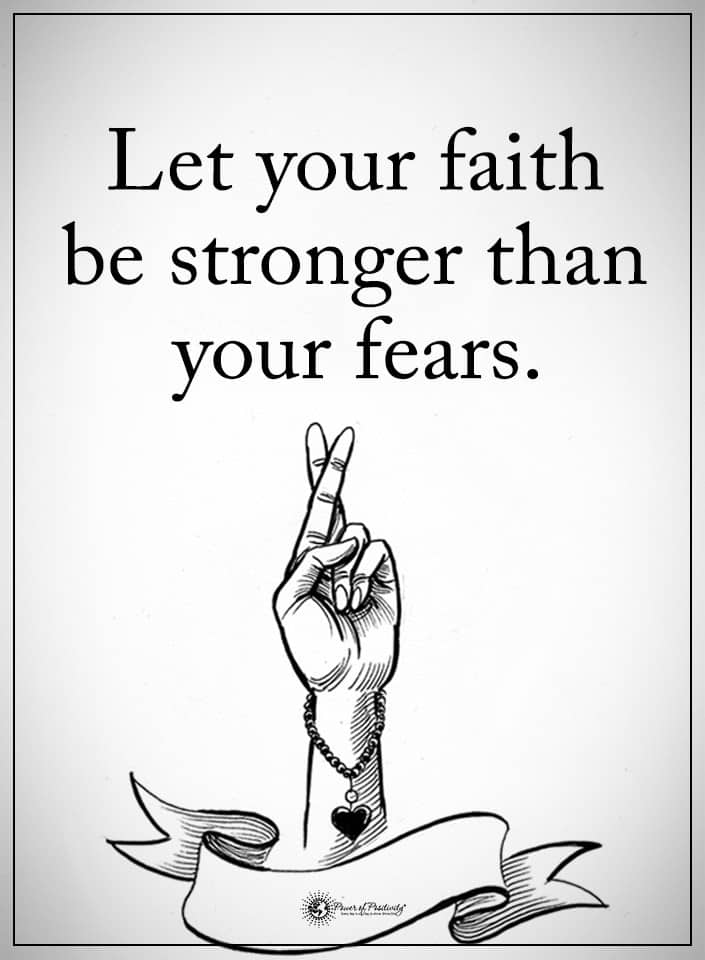Life has its fair share of ups and downs, and most people will experience suffering to a certain extent within their lifetime. It’s a good idea to prepare for the unexpected, but what happens when you focus too much on the possibility of suffering and live your life in fear of it?
This state is far from a healthy way of life, and it can even be damaging. When you are frightened of the mere concept of hardship, your progress and growth will stagnate. You could waste all the goodness within you if you allow anxiety to run your life.
Here Are 13 Ways Fear Of Suffering Can Limit Your Potential
1. You Procrastinate
Procrastination is a common problem faced by anyone who has ever had something important to do. But when you have a lot of fear, it exacerbates the issue even further.
Fear can paralyze you (more on that later), and your motivation is drowned out by it. This emotion causes you to push aside tasks that could help you or that need doing because you’re frightened of:
- Failing
- Being judged
- Being rejected
- Receiving criticism
- Not being satisfied with the result
All this fear will make you put off whatever you have to do in favor of staying far, far away from anything that could warrant these responses – and, unfortunately, that is just about anything in life.
2. It’s Bad For Physical Health
Fear causes your body to experience high levels of stress – and stress isn’t particularly healthy for you. Stress doesn’t just decrease your positive thinking – it reduces your bodily health in ways you may not be aware of.
Chronic and repeated stress keeps your body on edge. You’re never really is a resting state when you’re always expecting the worst. It can increase your risk of developing the following disorders (or make them worse if you already have them):
- Headaches
- Obesity
- Asthma
- Diabetes
- Muscle pain
- Heart disease
- Gastrointestinal issues
- Chest pain
- Back pain
- Anxiety
- Depression
- Libido issues
- Alzheimer’s disease
- Fatigue
- Lowered immunity
- Insomnia
3. You Care Too Much What Others Think
A general rule of life is that you cannot please everyone. There will always be people who dislike you, disapprove of your decisions, or aren’t that interested in you. And that’s okay! It doesn’t mean you’re a terrible person, and it shouldn’t be a reflection of your sense of self.
Fear of suffering often translates to a fear of criticism, reprimand, or judgment from others. This feeling can cause you to put too much stock into the thoughts of others. While it’s important to listen to and value feedback, this type of overly-reliant mentality can severely stall your progress. You are the captain of your fate – act like it!
4. Your Expectations Get Too High
Many people who fear suffering have made all sorts of crazy ideas in their heads for what bad things are going to happen to them – but they’ve also created out-of-reach ideas for their standards. You may feel like you have to be perfect to avoid perceived suffering – an impossible task to begin with.
Of course, challenging yourself in critical, and you should always strive to set goals that are tough to reach. But there’s such a thing as too much! You need to keep your expectations realistic, or you’ll just be setting yourself up for failure and discouragement.
5. Your Energy Is Drained
When you’re fearful all the time, your energy gets drained very quickly – whether that’s physical, emotional, or mental power. All of it goes down the drain when your brain focuses on stress and terror.
Often, this energy further depletes when you entertain these fears of suffering. Your mental prowess goes to waste, focusing on all the bad things that could happen instead of rationally attempting to locate solutions or turn to positive thinking of the sake of better clarity. It’s a very non-constructive way of thinking.
Every single moment you spend concentrating on your fears is another potentially decisive moment wasted!
6. You Need To Be In Control
When you’re afraid of suffering, you can become something of a control freak. The world feels like it’s spinning outside of your grasp. So you desperately reach for anything at all in your life to exert power over. You try to prove to yourself that you’ll be okay.
This type of micromanagement isn’t healthy for you, and it causes you to view the world with undeserved suspicion. You don’t want to leave anything to chance. Therefore, you avoid all things that may lead down negative roads – which is everything! You can’t control everything in your world, but that doesn’t have to be a bad thing.
7. You Only See The Negatives
Fear isn’t capable of positive thinking. It fills the world with shades of gray, stopping you from seeing anything good in it at all. Even when met with opportunities, you so fear suffering that you won’t want to take them.
For example:
- Positive: I have an interview for a new job!
Negative: I’m probably not qualified enough anyway.
- Positive: This person I’m dating is really amazing!
Negative: I’m going to mess it up.
- Positive: I have enough time to sign up for a class I’ve always wanted to try!
Negative: I’ll likely do poorly at it, and it’ll end up being a waste of money.
8. You Play It Safe And Settle
If it wasn’t clear from our previous points, fear makes you want to play it safe. In your comfort zone, you can control things, predict things, and do what you know. This situation means settling for less than you deserve in many aspects of your life, including:
- Jobs
- Romance
- Relationships
- Business ventures
- Deals and agreements
What does that mean? It means you’ll be harming yourself and your potential, often. You’ll take the more comfortable and less promising route just because it’s familiar, ignoring that a small jump of faith could bring you to an amazing new place in your life.
9. You Never Speak Up
Fear, unfortunately, often means being a doormat, too. This ties into a wish for everyone to perceive you in a good way. Fearing judgment or ridicule, you may:
- Keep your thoughts and opinions to yourself
- Not feel comfortable standing up for yourself when you need to
- Be too anxious to ask for what you want
- Neglect communication and keep problems to yourself
- Never contribute new ideas or suggestions that could potentially earn you praise
Not only does this make it impossible to make real friends, but it also considerably limits you. People can walk all over you for as long as you refuse to speak up and out.
10. You Say Yes And No At The Wrong Times
Fear is often heavily focused on self-preservation. You want to be liked and to avoid suffering, so you’ll base your answers on what you think others want to hear, not on what you believe.
You may say yes when you want to say no, such as when:
- Someone keeps asking favors of you
- People ask for your time when you don’t have much to give
- Others ask if you approve of or agree with certain things, and you don’t
You may also say no when you want to say yes, such as when:
- You’re too afraid to try something that looks exciting to you
- Someone asks you if something’s wrong, and there is
- Others ask if you approve of or agree with certain things, and you do
11. You Don’t Plan For The Future
The future is scary as it is, but when you add the fear of suffering into it, it becomes downright petrifying. There’s no way for you to look into the future and know what’s going to happen next, so your positive thinking in this area will plummet with fear.
Thinking about the future when you’re so frightened only gives you more and more anxiety. You can’t predict what will happen, so planning feels pointless. You begin to feel helpless or hopeless like you have no power over the situation.
But goal-planning for the future is a very crucial part of a positive and healthy future. You need to have a general idea, at the very least, of where you’re heading – and that’s just another way this fear stalls you.
12. You Can’t Move
Fear is paralyzing. It keeps you rooted in one spot because any movement would involve some form of risk. This anxiety can stop you from:
- Quitting a bad job
- Getting out of an abusive home or relationship
- Making big decisions that could change your life
- Going to rehab for an addiction
- Setting boundaries with family and friends
- Seeking therapy or mental health aid
Most commonly, this type of fear leads to the challenge of “decidophobia.” When faced with different options, you become so terrified by the fact that you can’t guarantee what the future will be, no matter what you choose, that you never choose at all!
 13. You Find Bad Ways To Cope
13. You Find Bad Ways To Cope
While this doesn’t happen to everyone, many people who live this sort of life, filled with overwhelming fear, the only way to cope with those feelings is to turn to vices and unhealthy coping mechanisms. These may include:
- Smoking
- Alcohol
- Gambling
- Drugs
- Empty pastimes (television, video games, etc.)
- Workaholic focuses
- Intimacy
- Self-harm
There’s nothing wrong with a little drinking now and then, the enjoyment of intimacy, or an hour or so a day spent doing nothing important. But when that becomes your whole life, you’re facing a severe and potentially life-threatening issue.
There’s nothing wrong with coping mechanisms, but they have to be positive in nature. Examples of suitable coping tools are:
- Exercise
- Journaling
- Expression through art
- Self-care days
Final Thoughts On Some Ways Fear Of Suffering Can Limit Your Potential
We all get a little scared sometimes, but it is essential not to allow that fear to control your entire life. When it does, you do yourself a disservice and stop yourself from reaching great heights.
If you need help overcoming your fear of suffering, don’t be afraid to seek advice from a counselor, therapist, psychologist, or other mental health professional. You are not alone in what you feel, and you can overcome it and live your life to the fullest.

















